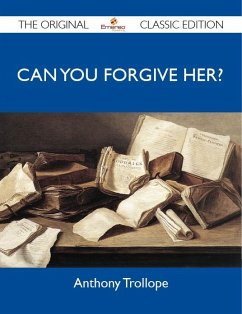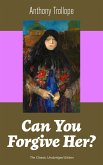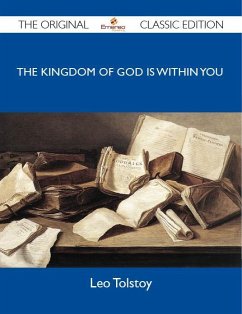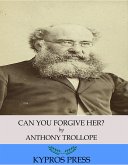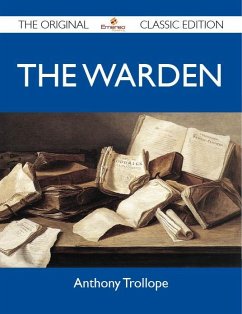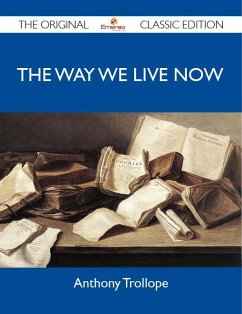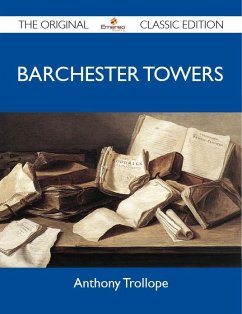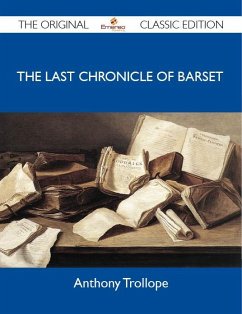With Can You Forgive Her? Trollope begins his masterful series of Parliamentary novels, but here he is concerned with the politics of love and the demands of society. Alice Vavasor, lovely, intelligent and just a bit prudish, is torn between two men -- the upright if plodding John Gray, and the evasive yet alluring George Vavasor. She has accepted and rejected their proposals of marriage, uncertain of her own worthiness and the worth of her love.
Alices dilemma makes for a sharp exploration of free choice, a womans role in a constricted society, and self-examination to the point of emotional stalemate. Add to this the predicament, on a grander scale, of Lady Glencora Palliser, Alices cousin. The energetic, vivacious and utterly charming Glencora is married to Plantagent Palliser, heir to a ducal throne, who is a man who finds passion in Parliamentary proceedings, not people. Glencora is still pining for the beautiful neer-do-well, Burgo Fitzgerald, whom she was forced to leave behind in order to marry as she had been groomed to. Glencora feels that her young marriage is a sham. She feels she cannot live a life without ardent love, that the future for her is bleak without a burning, almost tragic, passion.
Here, Trollope examines a marriage in its first tentative stages (in the Palliser novels he gives us the most discerning and moving portrait of a marriage in literature), with all of the self-sacrifice, compromise and reluctant devotion that marriage entails. The novels third subplot, involving Alices aunts choice between somewhat unsuitable suitors, provides a comic, yet still subtly touching, foil to the two main stories. Throughout, Trollope brilliantly evokes the power of society on its players, their private tumult, their public displays of decorum or disgrace. One scene in particular, at a fabulous ball, is among the most thrilling in literature, because Trollope manages to convey, amid the throngs of idle partygoers, the despair, the conflicted psychological motivations, the terror and anguish of two star-crossed lovers, Glencora and Burgo, whose passions are so different: hers a naive yet heartfelt romance, his a self-centered quest for an end to financial woe whatever the emotional cost and public scandal.
Neither party is self-aware enough to change here, but one eventually learns to, and finds hope by overcoming the hestitation of commitment brought on by misdirected ardor. The only way to grow is through sacrifice, and fearless self-knowledge. The only way truly to live is through doing the next right thing, publicly and privately.
Trollope takes us through the agonizing conflicts of his characters, drawn with a depth and nuance matched by few in literature. This is a towering achievement.
Alices dilemma makes for a sharp exploration of free choice, a womans role in a constricted society, and self-examination to the point of emotional stalemate. Add to this the predicament, on a grander scale, of Lady Glencora Palliser, Alices cousin. The energetic, vivacious and utterly charming Glencora is married to Plantagent Palliser, heir to a ducal throne, who is a man who finds passion in Parliamentary proceedings, not people. Glencora is still pining for the beautiful neer-do-well, Burgo Fitzgerald, whom she was forced to leave behind in order to marry as she had been groomed to. Glencora feels that her young marriage is a sham. She feels she cannot live a life without ardent love, that the future for her is bleak without a burning, almost tragic, passion.
Here, Trollope examines a marriage in its first tentative stages (in the Palliser novels he gives us the most discerning and moving portrait of a marriage in literature), with all of the self-sacrifice, compromise and reluctant devotion that marriage entails. The novels third subplot, involving Alices aunts choice between somewhat unsuitable suitors, provides a comic, yet still subtly touching, foil to the two main stories. Throughout, Trollope brilliantly evokes the power of society on its players, their private tumult, their public displays of decorum or disgrace. One scene in particular, at a fabulous ball, is among the most thrilling in literature, because Trollope manages to convey, amid the throngs of idle partygoers, the despair, the conflicted psychological motivations, the terror and anguish of two star-crossed lovers, Glencora and Burgo, whose passions are so different: hers a naive yet heartfelt romance, his a self-centered quest for an end to financial woe whatever the emotional cost and public scandal.
Neither party is self-aware enough to change here, but one eventually learns to, and finds hope by overcoming the hestitation of commitment brought on by misdirected ardor. The only way to grow is through sacrifice, and fearless self-knowledge. The only way truly to live is through doing the next right thing, publicly and privately.
Trollope takes us through the agonizing conflicts of his characters, drawn with a depth and nuance matched by few in literature. This is a towering achievement.
Dieser Download kann aus rechtlichen Gründen nur mit Rechnungsadresse in A, D ausgeliefert werden.

